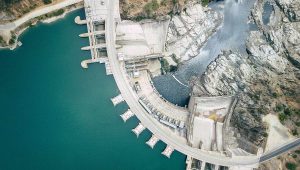What can the WASH sector do to tackle climate change? 4 questions to Ricard Giné
“There is today increasing evidence that the water sector, and particularly the delivery of WASH services, is a major contributor to GHG emissions. ”
Wastewater treatment produces around 1-3 percent of the world’s total greenhouse gas emissions, including some 12 percent of methane emissions and approximately 4 percent for nitrous oxide. At the same time, the management of drinking water and wastewater treatment are responsible for 4 percent of global electricity consumption. The amount of energy consumed is also expected to increase by 50 percent by 2030.
So, there is significant mitigation potential here, but we don’t yet have enough data and that is concerning. We need to close these data and knowledge gaps to improve how WASH is integrated into climate policies and mitigation strategies, and not least to strengthen their implementation.
What needs to happen now?
We need to understand the linkages between different levels of WASH services and climate mitigation. For instance, 1.7 billion people still lack safely managed sanitation services, and they need to be given access. This should be viewed also as an opportunity to significantly reduce direct GHG emissions, with a view to optimizing the entire faecal sludge management service chain.
Similarly, as regards the 34 percent of the global population with safely managed sanitation through sewer connections, there are three identified possible approaches to reduce GHG emissions:
- minimization through the modification of operational conditions
- prevention by applying new configurations and processes
- capture and treatment of the gaseous streams containing GHGs
What would you like people to do now?
Business-As-Usual approaches are no longer acceptable, and it is important to transition towards more climate-resilient services. This is not only a question of infrastructure, but mitigation solutions must span the whole water supply and sanitation chain. It is also important to highlight that the adoption of climate solutions cannot be an excuse to delay the delivery of services to those that today continue to be underserved.
“The adoption of climate solutions cannot be an excuse to delay the delivery of services to those that today continue to be underserved. ”
Recent studies suggest that much of climate-related finance fails to align with critical needs. A shift in financing priorities is therefore needed from a human rights and climate justice perspective to ensure that the most efficient, effective, and equitable measures within the water and sanitation sector are identified and implemented. In this regard, the priority in low-income contexts should be to secure access to basic services, with mitigation opportunities considered in the context of win-win solutions.
Watch the webinar
Enable cookies to show the video below. Or watch it directly on YouTube.
Read the report
The report 'The essential drop to reach Net-Zero: Unpacking Freshwater's Role in Climate Change Mitigation' shows a new way of thinking about climate change that can lead to more effective solutions.
Explore thee chapters

















